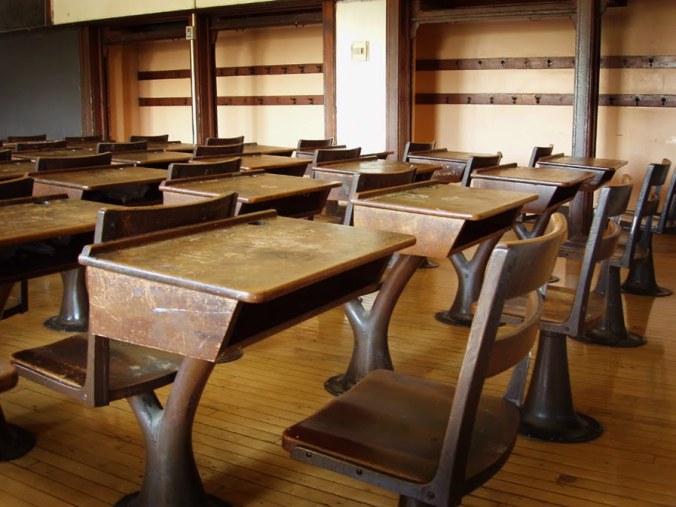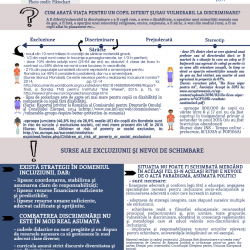Re-humanizing education
In late summer, I began to work on a lax plan for my teaching in the new school year. I reflected on the contemporary issues, domestic and foreign, that I find most relevant and urgent in our world today, and why. I weighed pros and cons of different approaches to these issues, including different pedagogies. I have embraced with renewed enthusiasm Freire's conviction that „banking education” will not only not get us there but, with every standardized test and student performance numeric indicator, every politically-grounded principal and meddling of the Orthodox Church into public education policy design, we are going deeper and deeper into trouble.
I pondered again on what should and can be done from within the confines of a still very centralized and highly politicized system, in order to make sure that what we give our students is not banking education, but rather companionship along a route that will aid them towards self-discovery, self-love and self-confidence, and ultimately fulfillment of their full potential.
Before moving onward, a few words about banking education: it is that approach by which a teacher considers it is his or her mission to teach kids what's „best” for them, and to „best” equip them for „life” - understood as a prescribed function, or set of functions, that the capitalist economy and a highly normative society lays out for them as „good”, „worthy” or „profitable” paths. In this approach, teaching is an “an act of depositing, in which the students are the depositories and the teacher is the depositor. Instead of communicating, the teacher issues communiques and makes deposits which the students patiently receive, memorize, and repeat.” In this system, the students are „objects,” while the teacher is the „subject,” who knows everything - including what needs to be achieved for self-fulfillment, presented illusorily as „success.”
One key issue with banking education is that it creates and maintains hierarchies through „evidence-based” superiority and inferiority of different instruments and techniques - thus corroding and steering people away from solidarity, equality, and ultimately dehumanizing all participants into desperately competing (therefore who cares about ethics!) runners in a race towards ignorance, alienation, misery and war. Misery both mental and physical, since we dont need statistics to observe with our naked eye that the haves are in constant fear of losing what they have, so they often resort to protection and defenses such as expensive anti-burglary systems, therapy, meds etc – or worse, right-wing politics, Nazism etc. This causes the have-nots to live in conditions that go lower and lower than any conceivable threshold of poverty and dignity. We could list a number of dystopias here for warning, but for the sake of brevity let's just stick with Huxley's classic Brave New World. Thus, by extrapolation, it could be argued that in the future banking education can lead (if it hasn't already) to a level of fear and alienation of the whole society which might prevent its very diagnostication, nevermind treatment.
In a world in which it has become highly problematic to feed or clothe oneself ethically and healthily (nevermind to pay the bills), teachers, students and parents make it their live's turning point what scores students get in national/standardized exams in which the key question is, say, how does one prove that Cinderella is a fairy tale, as opposed to a short story. That is so far from the common-sense and empathy that Freire teaches us that one does not even know where to begin the process of turning the tables. In addition, there is a well put-in-place system whereby teachers are encouraged to not consider the students as their partners in education, but rather as their opponents on the road to winning awards, salary increments, recognition in national and international inter-scholastic competitions – or, even more sadly and dramatically, safety and (self)respect.
So how does one make sure that one still has a job, and is also not feeding kids establishment BS - while at the same time equipping them for the exams that both students and especially parents are so adamant about?
By empathy, I would contend. Empathy understood not (only) as that unicorn-flavored love-for-all, but (also) as constantly probing one's real motivation for different actions, wishes, fears. Empathy as a cultivated and practiced desire to not treat one's peers as inferiors or superiors, but rather as companions-in-wonder, fellow alices-in-wonderland - now, that's Freire for you. Well, for this grassroots educator anyway.
It is essential to consider as our key objective the students' ability to question and evaluate the world. In its absence, many students are deprived of the opportunity to better their lives, and many come to just hover around the school absent-mindedly or fearfully, or even drop out of school for lack of perfomance and support. In Romania, this is the case of Roma students, students with disabilities, LGBT students, students from families who had to migrate to survive (economically and/or physically), Jewish students, students of diverse religions - other that Christian-Orthodox. Often, more girls than boys will be victims of oppression from the very apparatus that is supposed to aid their development. Often, several of the identities enumerated above will co-exist – but try to talk about intersectionality in a Romanian high school „cancelarie” - even that of an elite high school such as the one I teach at!... As for school principals, they're too busy protecting their seats of power to realize that their ignorance of such matters can backfire like no other political turnover.
Now let us examine what can be done to prevent banking education, and steer things in the direction of cooperative learning and support, rather than indoctrination and standardization.
In my opinion, in countries in which huge political change has taken place, where inevitably economic disparity and intolerance will instantly explode and socio-economic and cultural cleavages will become too wide to bridge before we know it, equipping teachers with Freire's POTO rather than the tools and techniques of banking education should be mandatory. We must reinvent the very definition of notions such as „teaching,” „learning” ,„evaluation,” „success.” Numbers must stop bearing ultimate relevance in policy-making.
Freire's pedagogy stands on a few pillars. The most important for me personally, as a public system and grassroots educator of Roma descent with a solid background in human rights activism, are dialogue and critical thinking.
For Freire, “to exist, humanly, is to name the world, to change it”. For this, one has to be offered the opportunity to see, to recognize that oppresses him/her by use of power – and for this to happen, dialogue is essential. Dialogue as “the encounter between men, mediated by the world, in order to name the world” is only possible in an atmosphere in which everyone feels supported and equally important, an atmosphere in which participants feel comfortable to talk and explore together the issues and solutions related to their real lives, their day-to-day struggles and needs. To get there, “profound love for the world and for people” is needed. There needs to be humility, trust and a positive or constructive frame of mind on all sides that are meant to support the students: teachers, parents, principals, policy-makers. Without this, the students cannot learn it themselves – and thus the problematic effects described above will inevitably and grimly cascade onwards.
Freire warns us that dialogue alone is not enough for oppressed students to become “more fully human.” Critical thinking is an essential skill to exist, for constructive results to be reaped. Transformation is not posible without critical thinking. In Freire's words:
„True dialogue cannot exist unless the dialoguers engage in critical thinking, [...] which discerns an indivisible solidarity between the world and the people, and admits of no dichotomy between them; [...] which perceives reality as process, as transformation, rather than as a static entity; which does not separate itself from action, but constantly immerses itself in temporality without fear of the risk involved.”
This article is not just meant as an overview of a few theoretical concepts in Freire's pedagogy. It is meant as a call to action, informed by ideas which are altogether absent from „pedagogical modules” and whatever else our educational system conceives of as „teacher training.” It is a call to explore, formulate, put in practice and constantly question our own pedagogies; to constantly evaluate whether what and how we teach is to empower our students, as opposed to watching our own backs. In a system such as the Romanian one, not only the categories of students listed above risk being overlooked and oppressed, but all students – and indeed all teachers and parents.
To all a hearty „te aves baxtalo” in a new year of teaching and learning, and let us hope that reading this article will be a source of inspiration and information that will aid all in a constructive dialogue, aimed at identifying and addressing those issues that are relevant to our students' lives, so as to best equip them to solve them and ultimately to achieve their full and true potentials.
Roxana Marin. High school teacher of English, British and American culture and civilization, World Literature. Public speaking and debate coach and adjudicator. Community organizer. Educational equity consultant. Behavior change training designer and facilitator. Roxana goes by many titles, but none truly fit her personality in full . She just says she's the Cosbuc teacher and founder of the Center for Action and Responsibility in Education. And that she's a nice lady, always having some cookies around. No mention of the dark side.









